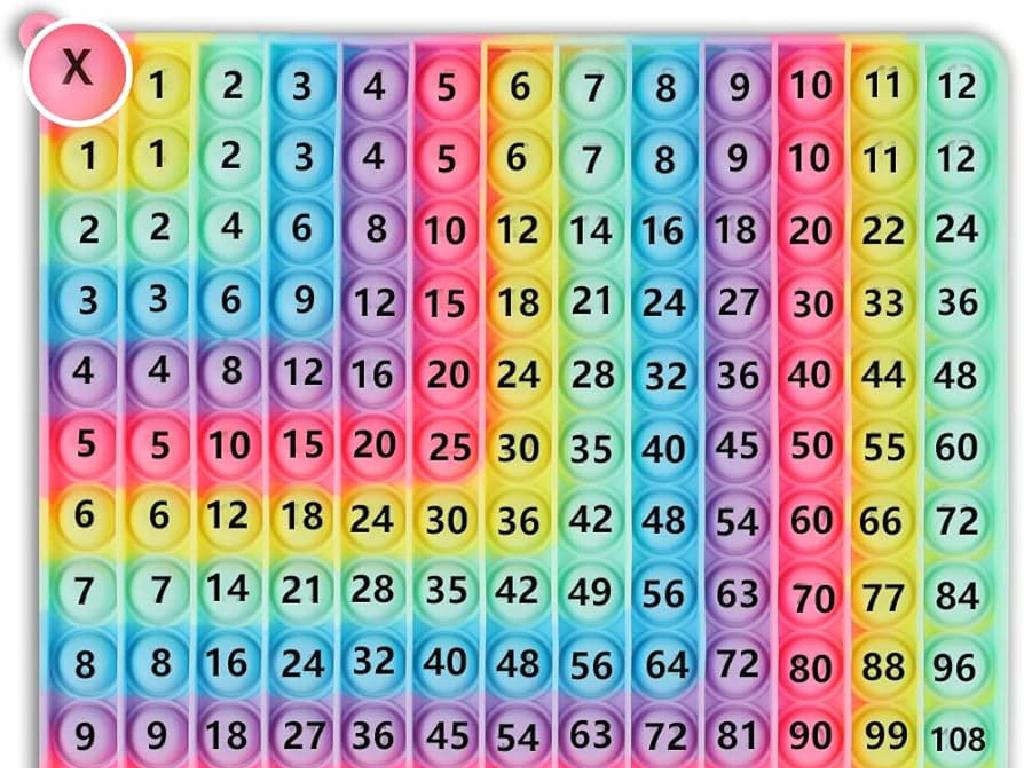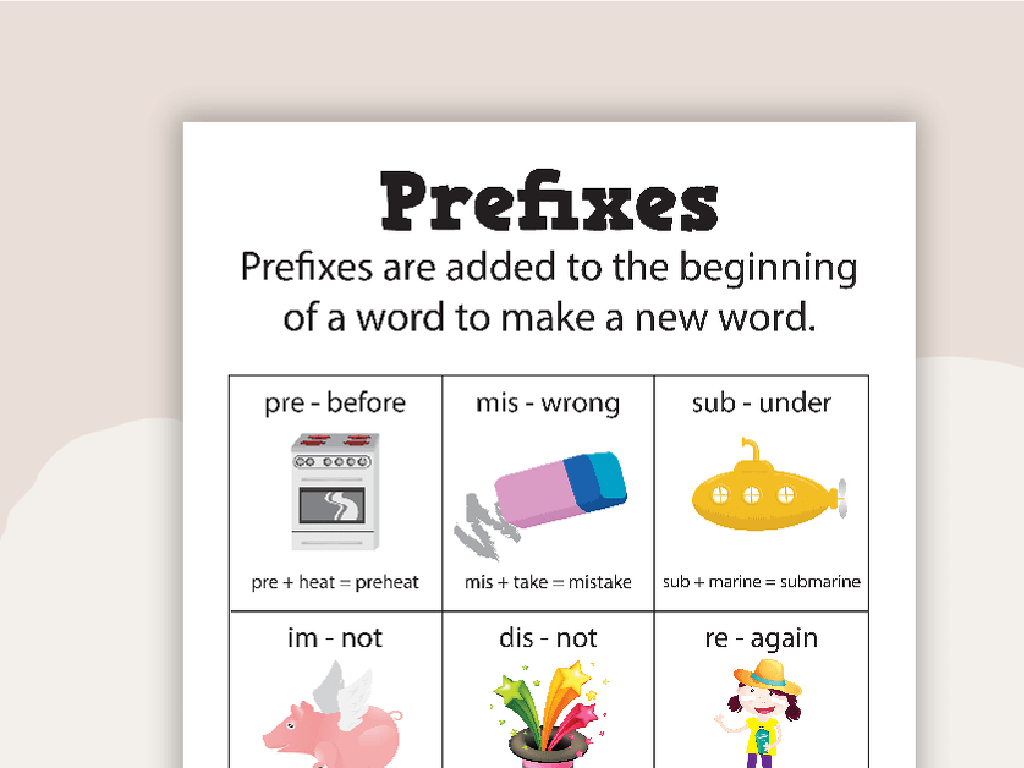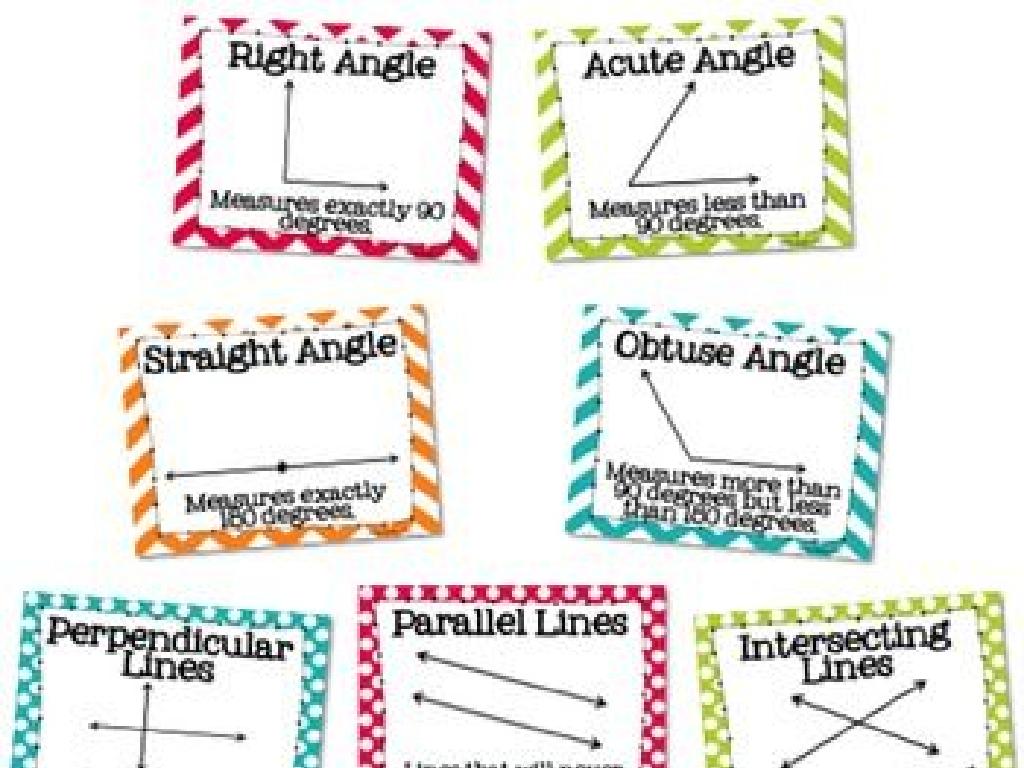Identify Base Words, Prefixes, And Suffixes
Subject: Language arts
Grade: Fourth grade
Topic: Prefixes And Suffixes
Please LOG IN to download the presentation. Access is available to registered users only.
View More Content
Exploring Word Building Blocks
– Discover word parts: Prefixes, Base, Suffixes
– Prefixes: Beginnings that change meaning
– Examples: ‘un-‘ in ‘unhappy’, ‘pre-‘ in ‘preview’
– Base words: Stand-alone word units
– ‘Happy’ and ‘view’ are base words that can stand alone
– Suffixes: Endings that add to meaning
– Examples: ‘-ful’ in ‘joyful’, ‘-ness’ in ‘kindness’
|
This slide introduces the concept of prefixes, base words, and suffixes to fourth-grade students. Prefixes are word parts added to the beginning of a base word to alter its meaning, such as ‘un-‘ changing ‘happy’ to ‘unhappy’. Base words are words that can stand alone and have meaning by themselves, like ‘view’. Suffixes are word parts added to the end of a base word to modify its meaning or create a new form of the word, such as adding ‘-ness’ to ‘kind’ to form ‘kindness’. Encourage students to think of other examples and to notice how the meaning of the base word changes with different prefixes and suffixes. This understanding will help them decode unfamiliar words and expand their vocabulary.
Exploring Base Words
– What is a base word?
– A word that has meaning on its own and can stand alone.
– Examples of base words
– ‘run’, ‘happy’, ‘place’ are words that make sense by themselves.
– Adding to base words
– Prefixes or suffixes can be added to base words.
– Changing word meanings
– By adding parts, we can make new words like ‘running’, ‘unhappy’, ‘placement’.
|
This slide introduces the concept of base words to the students. Base words are the most simple form of a word that can stand alone and have meaning. Provide examples such as ‘run’, ‘happy’, and ‘place’ to illustrate words that do not need additional parts to make sense. Explain that we can add prefixes (beginnings) or suffixes (endings) to these base words to alter their meaning, creating new words. For instance, adding ‘un-‘ to ‘happy’ changes the meaning to not happy, and adding ‘-ing’ to ‘run’ changes it to a continuous action. Encourage students to think of other base words and how they might change with different prefixes or suffixes.
Meet the Prefix
– What is a prefix?
– A prefix is a set of letters at the start of a word.
– Prefixes modify meanings
– They alter the original meaning of the word.
– Example: ‘unhappy’
– ‘Unhappy’ means not happy.
– Example: ‘redo’
– ‘Redo’ means to do again.
|
This slide introduces the concept of prefixes to the students. Explain that a prefix is a group of letters placed before the base word to change its meaning. Provide examples such as ‘unhappy’ where ‘un-‘ means not, turning the word ‘happy’ into its opposite. Similarly, ‘redo’ where ‘re-‘ means again, indicating that the action is to be done another time. Encourage students to think of other words with prefixes and discuss how the meaning changes. This will help them understand how prefixes can be used to form new words and expand their vocabulary.
Meet the Suffix: Word Transformers
– What is a suffix?
– A suffix is a letter group added to a word end.
– Suffixes modify meanings
– They can alter tense, number, or speech part.
– Suffixes change word forms
– ‘Walk’ becomes ‘walked’ (past tense) with ‘-ed’.
– Examples: ‘running’, ‘happiness’
– ‘Run’ to ‘running’, ‘happy’ to ‘happiness’.
|
This slide introduces the concept of suffixes to students, explaining that they are groups of letters placed at the end of words to change their meaning or function. It’s important to show how suffixes can alter the tense of a verb (e.g., ‘run’ to ‘running’), turn a word into a noun indicating a state of being (e.g., ‘happy’ to ‘happiness’), or change the number from singular to plural (e.g., ‘place’ to ‘places’). Provide clear examples for each case and encourage students to think of more examples themselves. This will help them understand how suffixes affect the words they use every day.
Creating New Words with Prefixes and Suffixes
– Prefixes and suffixes create new words
– They modify the meaning of base words
– Example: ‘play’ + ‘ful’ = ‘playful’
– ‘Playful’ means full of play or fun
– Adding ‘un’ to ‘playful’ makes ‘unplayful’
– ‘Unplayful’ means not full of play or fun
– ‘Un’ changes the meaning to its opposite
|
This slide is designed to teach students how prefixes and suffixes alter the meaning of base words. Start by explaining that a base word is a word that can stand alone and has meaning (e.g., ‘play’). Then, show how adding a suffix like ‘ful’ changes the meaning to ‘full of play or fun.’ Next, demonstrate how adding a prefix like ‘un-‘ can change the meaning to its opposite, ‘not playful.’ Encourage students to think of other examples and to understand that ‘un-‘ is a common prefix that negates the original meaning of the word. This activity will help students expand their vocabulary and understand how word parts work together.
Practice Time: Exploring ‘disrespectful’
– Identify base word, prefix, suffix
– Base: ‘respect’, Prefix: ‘dis-‘, Suffix: ‘-ful’
– Define ‘disrespectful’
– ‘Disrespectful’ means showing lack of respect
– Create a new word with ‘respect’
– Example: ‘respectable’ means worthy of respect
|
This slide is an interactive activity for students to understand the components of the word ‘disrespectful’. Start by breaking down the word into its base word ‘respect’, the prefix ‘dis-‘ which means ‘not’, and the suffix ‘-ful’ which means ‘full of’. Discuss the meaning of ‘disrespectful’ as showing a lack of respect or courtesy. Then, challenge students to use the base word ‘respect’ to create a new word, such as ‘respectable’, and define it. Encourage creativity and guide them to understand how prefixes and suffixes modify the meaning of base words. This activity will help solidify their understanding of word structure and enhance their vocabulary.
Let’s Play: Word Construction Game
– Form teams for the game
– Add prefixes/suffixes to base words
– Prefixes like ‘un-‘ or ‘re-‘ and suffixes like ‘-ful’ or ‘-less’
– Create new words with your team
– Explain your words and their meanings
– Share how the prefix or suffix changed the base word’s meaning
|
This interactive game is designed to help students understand how prefixes and suffixes modify the meaning of base words. Divide the class into small teams and provide them with a list of base words. Encourage them to use their creativity to add prefixes and suffixes to create new words. Each team will then present their words to the class, explaining the meaning of each new word and how it was derived from the base word. This activity will reinforce the concept of word construction and enhance vocabulary. Possible variations of the activity could include a timed challenge, using the most prefixes/suffixes, or creating sentences with the new words.
Word Creator Challenge: Exploring Prefixes and Suffixes
– Pair up and pick base words
– Add prefixes and suffixes
– Make a list with meanings
– Example: ‘happy’ becomes ‘unhappy’ or ‘happiness’
– Share and discuss changes
|
This class activity is designed to help students understand how prefixes and suffixes modify the meaning of base words. Students will work in pairs to encourage collaboration. They should start with a selection of base words and then experiment by adding different prefixes and suffixes to create new words. Encourage them to use their creativity and come up with a variety of examples. After creating their list, each pair will write down the new meanings. This exercise will culminate in a class discussion where students will share their lists and explore how the meanings of the base words have been altered by the prefixes and suffixes. Possible activities: 1) Use flashcards with base words, 2) Provide a list of common prefixes/suffixes, 3) Create a word wall with the new words, 4) Have a ‘word of the day’ challenge, 5) Encourage students to find examples in their reading assignments.
Wrapping Up: Prefixes and Suffixes
– Congratulations on learning about prefixes and suffixes!
– Homework: Discover 5 words with prefixes or suffixes
– Look for words in books or around you
– Write down each word’s meaning
– Use a dictionary to find the meaning
– Share your findings next class
– Think about how the prefix or suffix changes the meaning
|
Today’s lesson focused on understanding the role of prefixes and suffixes in word formation. For homework, students are encouraged to apply this knowledge by finding words in their environment or while reading. They should write down the meanings of these words, considering how the prefix or suffix alters the base word. This exercise will help reinforce their understanding and prepare them for a discussion in the next class, where they will share their discoveries, fostering a collaborative learning environment.





